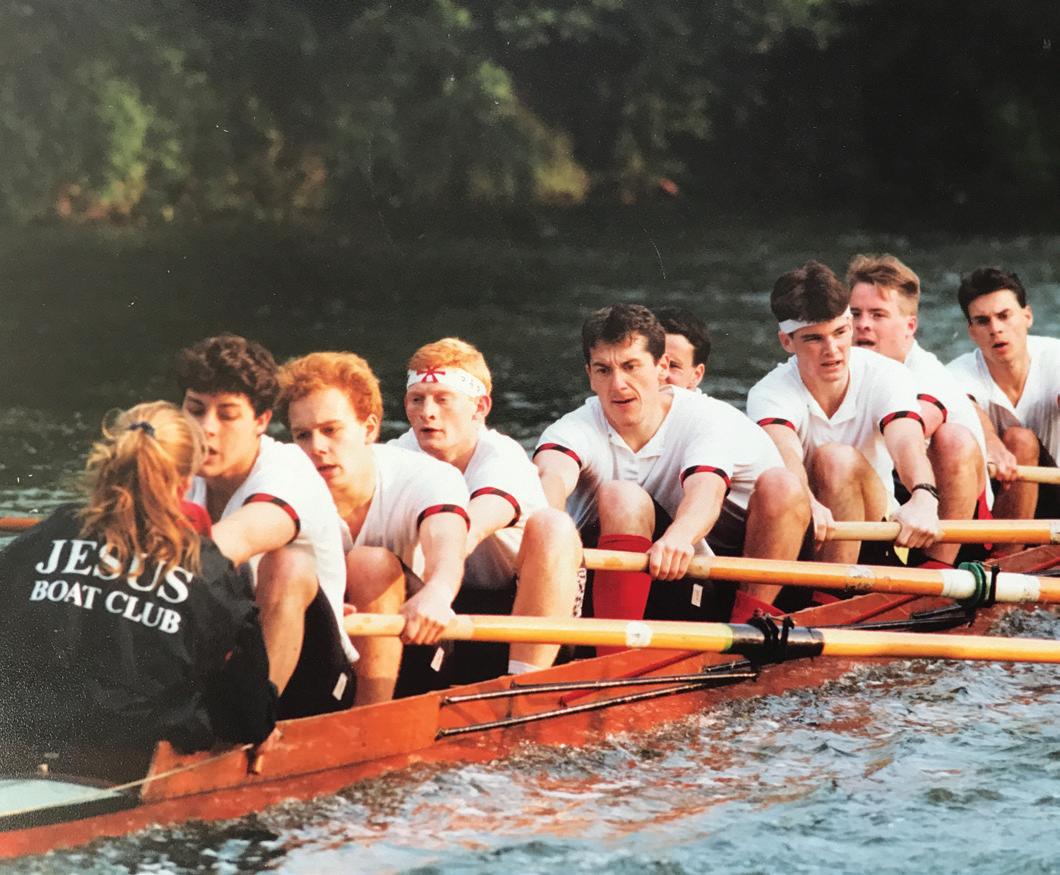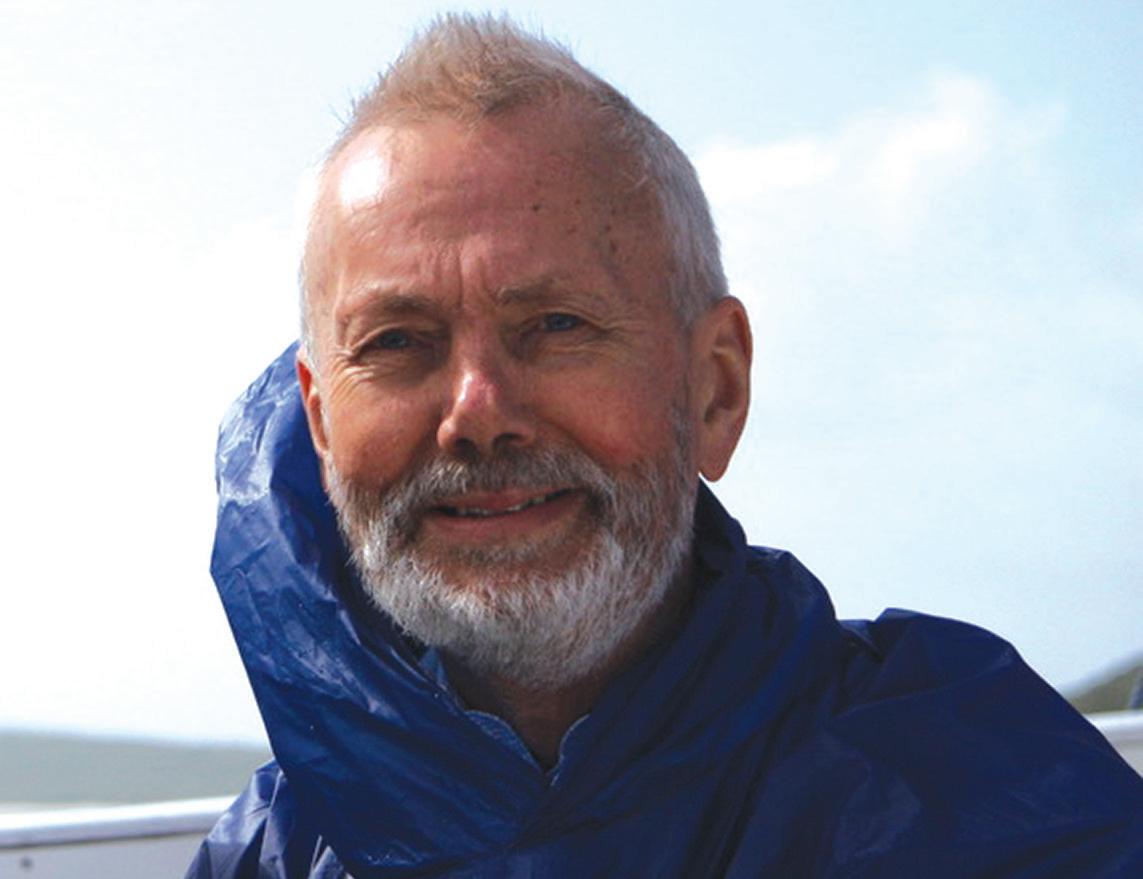
5 minute read
Alumnus makes a difference with remdesivir
As a third-year undergrad in Natural Sciences, Richard Mackman gradually realised what he wanted to do: “I wanted to create something as a chemist that would make a difference,” he says. And with the development of remdesivir, he has.
Richard had never forgotten how his school chemistry teacher had described his work on a new cancer treatment. “The science was amazing to me, that chemists could manipulate compounds to change their medicinal properties. By my third year I had a singular vision – I wanted to do medicinal chemistry and drug discovery.”
Now, as Vice President of Medicinal Chemistry at Gilead Sciences, Richard has achieved his goal with the development of remdesivir, which was first used against Ebola and has recently been approved for Covid-19 treatment by the US Food and Drug Administration (FDA).
Richard feels lucky to have made it to Cambridge in the first place. His comprehensive school in West Yorkshire did not have a record of sending students to Oxford and Cambridge. However, the Head of Chemistry encouraged Richard to look at both universities.
Richard particularly liked the Natural Sciences tripos at Cambridge and decided to apply to Jesus. “The Head arranged for my chemistry teacher David Morris, a Cambridge alum, to help me prepare for the exam. David taught me the special chemistry course after school, all without charging my parents,” Richard recalls gratefully.
Richard came up to Jesus in 1985. He had chosen Natural Sciences because it allowed him to explore different subjects. “At Cambridge I liked that I didn’t have to limit myself to just one subject straight away.
Coming to Cambridge from a comprehensive school background, Richard felt intimidated and awed by the
Richard at his desk in Gilead Sciences.
traditions and talent. “You come from a school where you are a bright student at the top of the class, and then find when you arrive here you are just middle of the road – that can be challenging and make you wonder if it was a good decision.”
However, Richard soon became captivated by organic chemistry. Perhaps this has something to do with his Chemistry supervisor at Jesus, Professor Ian Paterson, an organic chemist known for his work on the synthesis of biologically active natural products. “I remember feeling very intimidated at first, but Ian’s great because his approach really puts you at ease,” says Richard. “Everything I know about organic chemistry I pretty much learned from Ian.
One of Richard’s best experiences at Cambridge was going to the Senate House to get his final year grades. “I got the right grade that I needed to have a chance at getting a PhD place: I immediately went to see Prof Battersby and he said ‘Yes - I was in!’”
As an undergrad, Richard played football and tennis for Jesus, but he says “one of the things it took me too long to do was come out of my shell.” His advice to his younger self would be “Don’t waste your time in your shell – get out of your comfort zone, join some societies, try some new things and build friendships.”
Having taken up rowing in his third year, as a postgrad Richard continued to row for Jesus (Richard is third back in the photo). He also obtained a full blue in Karate, which is exceptionally given for meeting certain criteria.

Richard recounts his typical day as a postgraduate: “A crew outing in the morning at 6am, then in lab by 8:30, tea at 10:30, lunch, lab all afternoon then karate training for two hours at 5pm, then back in the lab for another couple of hours.”
Richard thrived on this life. “The lab really became your home – we’d order Chinese food from the shop on the corner of Lensfield Road [editor’s note: this is still there!]. It was like a large family, and there was a great feeling of camaraderie – it wasn’t hard to be motivated.”
“Prof Battersby was a terrific gentleman and mentor, and he had this amazing way of getting the best out of you without being a task master.”
Richard also remembers Dr Finian Leeper as a real support, and has fond memories of Friday afternoons with Finian and lab colleagues at the Spread Eagle – “we had lots of great pub discussions there.”
“When I learned to embrace the Cambridge life, I had a brilliant time,” he says. “The PhD years were the best – having the lab family in Prof’s group was great. Doing a PhD is really when you build those lifelong bonds of friendship.”
Richard continues: “I loved Cambridge and didn’t want to leave, but I wanted to do drug discovery for a career, and I really wanted to see the world too. Prof recommended Paul Ortiz de Montellano at the University of California in San Francisco, who agreed to fund me for two years, so that worked out brilliantly.”
Richard then worked for several start-ups in the Bay area before joining Gilead, which focuses on drug discovery, particularly related to anti-virals. The company had recently developed Tenofovir, a treatment for HIV, and was growing rapidly.
Richard is proud to be associated with the development of remdesivir. “On the personal level, I succeeded in doing something that I set out to do more than 20 years a go, achieving a life ambition, if you like. The other part is that we occasionally get to see messages from the heart that come from people who were helped by remdesivir, so you recognise how people’s lives were made better by something you’ve contibuted to.”
Remdesivir is delivered intra-venously, so very early on in the crisis, Gilead started to develop a formulation that can be inhaled. “We had some experience in our group working on another respiratory product with inhaled delivery, so we could draw on that to move an inhaled version of remdesivir forward quite quickly. But these developments still don’t happen overnight – there’s a lot of new data required.” However, Richard is pleased to note that Gilead has now publicly announced that clinical studies on inhaled remdesivir have started. “The hope is that it will provide another option for patients, particularly when the drug might prevent the development of more serious disease leading to hospitalisation.”
What advice would Richard give to young people coming from a comprehensive school background like his? “Take the chance and don’t look back,” he says without hesitation. “Even though the Cambridge system was challenging, it was the best decision I made in my life.”
This article was adapted with permission from an original story on the Jesus College website.










